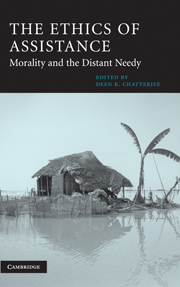Book contents
- Frontmatter
- Contents
- Notes on contributors
- Preface
- 1 Introduction
- PART I THE ETHICS OF DISTANCE
- PART II COMMUNITIES AND OBLIGATIONS
- PART III THE LAW OF PEOPLES
- 8 Women and theories of global justice: our need for new paradigms
- 9 Human rights as foreign policy imperatives
- 10 Human rights and the law of peoples
- PART IV RIGHTS, RESPONSIBILITIES AND INSTITUTIONAL REFORMS
- Index
10 - Human rights and the law of peoples
Published online by Cambridge University Press: 05 June 2012
- Frontmatter
- Contents
- Notes on contributors
- Preface
- 1 Introduction
- PART I THE ETHICS OF DISTANCE
- PART II COMMUNITIES AND OBLIGATIONS
- PART III THE LAW OF PEOPLES
- 8 Women and theories of global justice: our need for new paradigms
- 9 Human rights as foreign policy imperatives
- 10 Human rights and the law of peoples
- PART IV RIGHTS, RESPONSIBILITIES AND INSTITUTIONAL REFORMS
- Index
Summary
One of the many contributions to international thought of The Law of Peoples is a distinctive and unorthodox view about human rights. In this essay, I would like to explore the prospects for a political theory of human rights suggested by certain features of this view. I do not pretend to offer an interpretation, or even a variant, of Rawls' view, since in some respects I differ from it. But I believe the conception of human rights in The Law of Peoples poses an instructive challenge to adherents of more familiar philosophical views and I want to concentrate here on what might be learned from it.
HUMAN RIGHTS IN POLITICAL PRACTICE
Philosophical conceptions of human rights can go wrong by failing to take seriously the idea of a human right as we find it in international law and politics. We need a political theory of human rights because the international practice of human rights is problematic – it is unclear, for example, how these objects called “human rights” should be conceived, why certain values but not others should count as human rights, and what responsibilities, and for whom, attach to human rights. Any theory aiming to shed light on these problems should take account of the elements of international practice that give rise to them.
The contemporary practice of human rights originated during World War II, and achieved its first and defining public expression in the Universal Declaration of 1948.
- Type
- Chapter
- Information
- The Ethics of AssistanceMorality and the Distant Needy, pp. 193 - 214Publisher: Cambridge University PressPrint publication year: 2004
- 20
- Cited by

